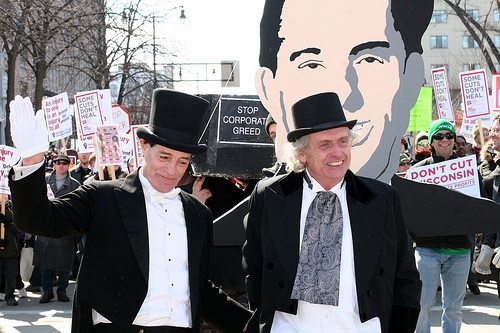
September 12, 2013;Huffington Post, “Politics”
Conservative billionaires Charles and David Koch, known to many as the Koch Brothers, have been widely reported to be at the center of a network of groups and organizations that support right-wing causes. With all the recent discussion of political activity in 501(c)(3) charities and 501(c)(4) “social welfare” organizations, it’s significant that the Koch Brothers are about to file a 38-page report with the IRS for a group called Freedom Partners, a 501(c)(6) “business league” with a mission of “defending innovators and entrepreneurs.”
Sign up for our free newsletters
Subscribe to NPQ's newsletters to have our top stories delivered directly to your inbox.
By signing up, you agree to our privacy policy and terms of use, and to receive messages from NPQ and our partners.
Freedom Partners, established in 2012, gave more than $250 million in grants to organizations including the Center to Protect Patient Rights, an anti-Obamacare group that received $115 million; Concerned Women for America Legislative Action Committee ($8.2 million); the National Rifle Association ($3.5 million); and the U.S. Chamber of Commerce ($2 million). The State Tea Party Express, the Tea Party Patriots, and Heritage Action for America were among groups that received less than $1 million each.
The Huffington Post report is based on a report from Politico’s Mike Allen and Jim VandeHei. As they note, this means that Freedom Partners was the second-largest conservative organization active in the 2012 election cycle, eclipsed only by Karl Rove’s Crossroads GPS, which spent $300 million.
Freedom Partners demonstrates several points about nonprofit organizations and political expenditures, regardless of political affiliation.
- First, there is more than one way to collect and distribute politically and/or ideologically motivated contributions. Almost all categories of nonprofits recognized by the IRS are allowed to engage in some level of political activity, though 501(c)(3) charities are prohibited from engaging in campaigns (see NPQ’s recent coverage of a Congressional Research Service analysis of political activity of charities) and 501(c)(4) social welfare organizations are restricted in how much must be spent for public education and advocacy activities as opposed to political involvement.
- Second, there’s more than one way to use nonprofit organizations to conceal the identities of donors. While political action committees (PACs) and so-called 527 organizations must disclose the identities of all or most donors, most other nonprofits do not have to disclose the identities of most of their supporters.
- Third, the same monies may be moved from group to group, making it even less clear who ultimately benefits from the donor’s gift.
- Fourth, because gifts may be transferred among several nonprofit groups, it will be easy to overcount the use of cash in elections without detailed flowcharting of the funds’ source and travels from group to group.
- Fifth, current laws and regulations allow nonprofit groups like Freedom Partners to organize and carry on activities for significant periods of time before being required to report their activities to the government. Review and regulation of political spending remains an activity performed largely after the election cycle is long passed.
It’s difficult to make changes to nonprofit regulation to modify how nonprofit organizations operate in elections. When do public education and issue advocacy become political activity? When does political activity intend to influence elections, and which elections does it seek to influence? Besides, there are some organizations whose advocacy we like and others we detest. Making it more difficult for nonprofits to advocate will likely affect many nonprofits, rather than just a few.—Michael Wyland










